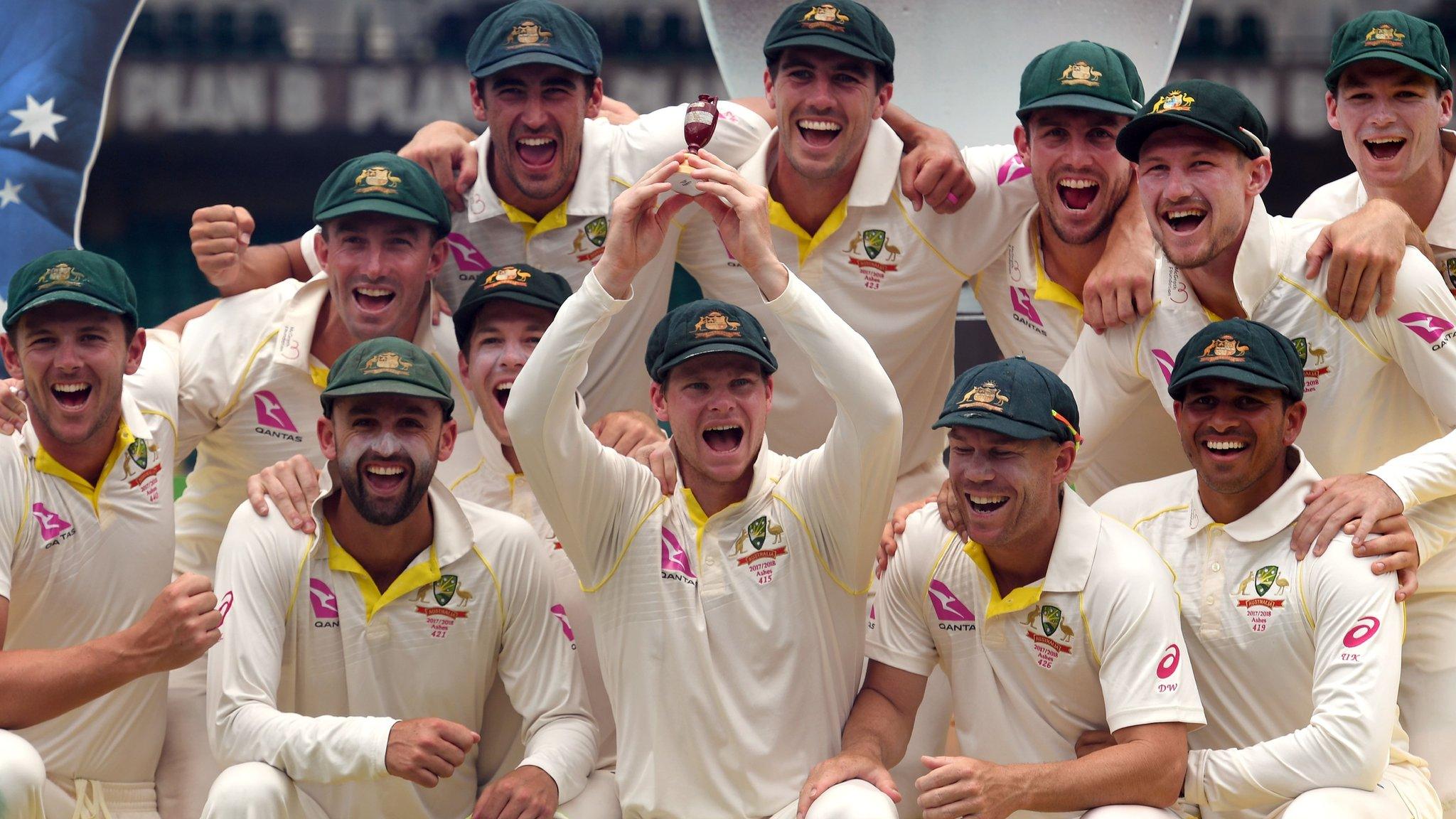Ashes: How can England win in Australia in 2021-22?
- Published
- comments

England coach Trevor Bayliss, who will stand down after the 2019 Ashes, predicted Joe Root will still be captain in 2021-22
And so it begins again.
Like so many times in the past three decades, England have been trounced in Australia.
After each chastening defeat - there have now been seven in eight series - we ponder how it might be different on the next tour.
On this occasion, there can be no shrugging of shoulders that England were outclassed by legends like Shane Warne and Glenn McGrath, or that a disintegrating team were blown away by Mitchell Johnson.
To be successful in 2021-22, England must acknowledge their shortcomings and implement change.
Captain Joe Root has said that the planning starts now. It may look something like this...
Face up to the problems
How many times during this tour have he heard England say that they have competed, or that there has not been too much difference between the sides?
Even after defeat in the final Test in Sydney, seamer James Anderson said he felt the series was closer than the 4-0 margin suggested.
"Rubbish," said former England captain Michael Vaughan. "If England really believe they have got close to Australia, they're kidding themselves. They are miles away from winning here."
Of the matches Australia won, two were by an innings, another by 10 wickets and the fourth when they opted not to enforce the follow-on.
When Australia batted, they averaged 51.41 per wicket. England managed only 29.15. With the ball, Australia took 89 wickets, England just 58. It has been a shellacking.
It is not an exception, either. Not only do England have a rotten record in Australia dating back to 1987, but their recent overseas results have been woeful; only one series win since 2012, no victory in their past 11 Tests.
The travel sickness has been set against a backdrop of home success - only once have England been beaten at home since 2012, often in conditions where the ball moves and their skilful fast-medium bowlers befuddle visiting batsmen.
In simple terms, England are brilliant at home, but awful when they have to dig out their passports.
"England have skilfully reduced expectations," said former spinner Graeme Swann. "We can't just say 'the boys have tried hard and we did our best'. That's not good enough.
"We need to be honest and ask why aren't we winning overseas?
"England need to find a way of winning. It's not as though pitches are being doctored to be unfair to touring sides. It's up to teams to not be satisfied with just winning at home, but to put an emphasis on winning away."
Manage the transition
Taking the squad that won in 2010-11 as a template for success, only seven players survived from the 5-0 whitewash four years previous.
In the intervening period, Swann, Stuart Broad, Matt Prior and Jonathan Trott established themselves in the Test side.
It is not an exact science, though. At the same time, Tim Ambrose, Amjad Khan and Darren Pattinson were all tried and discarded.
When looking for the pace, spin and runs that are needed to bring success in 2021-22, England must also face up to the reality of potentially losing all-time greats Anderson, Alastair Cook and Stuart Broad, who are all nearer the end of their careers than the beginning.

James Anderson, Graeme Swann and Alastair Cook celebrate winning the Ashes in Melbourne in 2010 with a Test to spare
England face a dilemma. Can they afford to wait for these stalwarts to call time, or do they try to integrate new faces while the experienced heads are still around?
"Someone might get thrown into Test cricket before they are ready, but that means they can learn at the highest level," said Vaughan.
"Don't leave it until Broad and Anderson have left and then bring in a couple of young seamers."
Coach Trevor Bayliss, who will not lead England in 2021-22, says that plan is a possibility, but supporters must understand the potential consequences.
"That could be a risk," he said. "If that was to occur and we're not as successful as we'd like because we're blooding some young players, we have to take that on the chin. Hopefully everyone realises we're heading in a certain direction."
Experience the conditions
Once England have found the players they think are best suited for the next Ashes tour, the challenge is to give them experience of foreign conditions.
Bayliss identified this as a key area of improvement following Australia's Ashes-clinching win in Perth, even going so far to suggest he would discuss with Cricket Australia if it can be more accommodating to English players, especially when so many Australian finish their education in county cricket.
Of the teams that took to the field in Sydney, eight Australians had played in the County Championship in England, while Mason Crane was the only Englishman to have tasted Sheffield Shield cricket - and only one game at that.
England's busy schedule prevents winters down under, so any time spent in Australia is likely to end up benefitting much younger players.
Perhaps the answer is for England to recreate Australian conditions to the best of their ability on home soil.
"It's very hard for players to get experience of playing four-day cricket in Australia, but you can take the conditions to where you are," said Vaughan, who led England to their 2005 Ashes triumph.
"That's what England have to do - find ways of preparing high-quality wickets in the UK and perhaps use the Kookaburra ball in some domestic cricket.
"Make them flat, so you spend days in the field when the ball doesn't do anything. That's where you need extra pace or quality spin and the batsmen have to go big."
Don't forget about 2019
Bayliss says winning the Ashes away from home is the "highlight" of a player's career, but England still have important assignments to complete at home. India visit for five Tests this summer and the first opportunity to win back the Ashes comes in the UK in 2019.
So there is a balance to be struck. Yes, England want to prepare well for their travels, but without giving up too much home advantage.
The quandary of developing an England team that can thrive in all conditions, as well as staying committed to winning at home and being successful in white-ball cricket - there's a home World Cup to think about too in 2019 - was called the "million-dollar question" by Bayliss.
"You should still try to win at home, then hopefully you produce players who are good enough to help you win away," said Swann. "I panic about putting more priority on winning in four years, rather than focusing on the here and now, or the next Ashes.
"If we start losing at home again, we really are screwed."
England's schedule until 2019 Ashes | |
|---|---|
2018 | 2019 |
March-April: New Zealand v England, two Tests | Feb-March: West Indies v England, three Tests |
May-June: England v Pakistan, two Tests | May-July: World Cup 2019 in UK |
Aug-Sept: England v India, five Tests | July: England v Pakistan, one Test |
Oct-Nov: Sri Lanka v England, three Tests | Aug-Sept: England v Australia, five Tests |
Failing to prepare is preparing to fail
England have stressed that their planning and preparation for this Ashes tour has been meticulous.
However, if we look at the successful campaign of 2010-11, there is a huge difference between what England did before that series and this.
Swann said England treated their warm-up matches seven years ago as a "mini-Ashes", winning two and drawing one of three matches, all of which were first-class fixtures.
This time around, England played a two-day match and two first-class games against mediocre opposition.
Admittedly, the strength of the teams they face is beyond the tourists' control - another thing Bayliss said he would discuss with Cricket Australia - but England managed to take only one wicket on the final day of the last warm-up game against a CA XI in Townsville.
"That lead-in is not ideal," said former Australia batsman Simon Katich, who was on the losing side in 2010-11.
"When England won, they played tough warm-up games and got great experience. This time, they played a lot of young kids in the CA XI games.
"It's not anywhere near the same level competition that you will face in the Tests."
Win the spin war
Root may have been joking when he responded to the question of what he could have done differently on this tour, his first as captain.
"I'd have made sure no-one was headbutting anyone," he said.
The skipper was alluding to the off-field problems that have blighted England's trip.
Ben Stokes' part in an altercation outside a Bristol nightclub in September robbed England of their talisman, while Jonny Bairstow's 'headbutt' on Cameron Bancroft not only created more unwanted headlines, but gave the Australians ammunition on the field.
What really happened between Bancroft & Bairstow?
When Ben Duckett poured a drink over Anderson, an irate Bayliss was once again forced to ask questions on the behaviour of his team, while Moeen Ali, a devout Muslim, was asked if he was going to stay out of the pub for a few days.
When Australia are winning and the opposition are shooting themselves in the foot, the home media can dish out brutal treatment to a touring team.
On the only recent occasion when England turned the tide, they got the press to turn with them.
"In 2010-11, we were on the verge of being annihilated in the first Test in Brisbane and we managed to draw the game," said Swann.
"The Australian press turned on their team quicker than I've ever seen the English media turn. By the end, we felt like we had them on our side.
"You should tell the England players that, if they are not winning and they are stupid enough to get caught doing something, they are going to get sent home."
Believe it can be done
If England have the right players, have experienced the conditions and prepared in the right manner, the final piece of the jigsaw is to get the better of Australia over five Tests in perhaps the most hostile cricketing environment on the planet.
Taking aside Australia's tendency to produce fast bowlers who like nothing more than to use Englishmen for target practice, touring teams have to deal with the baying, raucous and partisan crowds of the Gabba and the MCG.

Australian newspaper The Daily Telegraph's headline after Australia regained the Ashes with victory in Perth
In Swann's opinion, it is an area where England have fallen short on this latest failed tour.
"It is tougher to play here than anywhere else," he said. "It feels like 23 million against 11.
"The Australian national psyche is for you to be subservient, for you to lie down and be easy to walk all over.
"You have to go toe to toe with them. It's not going to be every individual who can do that, but your leaders need to be like that.
"There are too many shadow-lurkers in the current team who just want to play their cricket without being the centre of attention. They want to do well, but they don't want to be man of the match.
"Michael Vaughan stood toe to toe with them and I'm sure they respected him for the way he played. Andrew Strauss, our captain in 2010-11, did exactly the same."
- Published9 January 2018
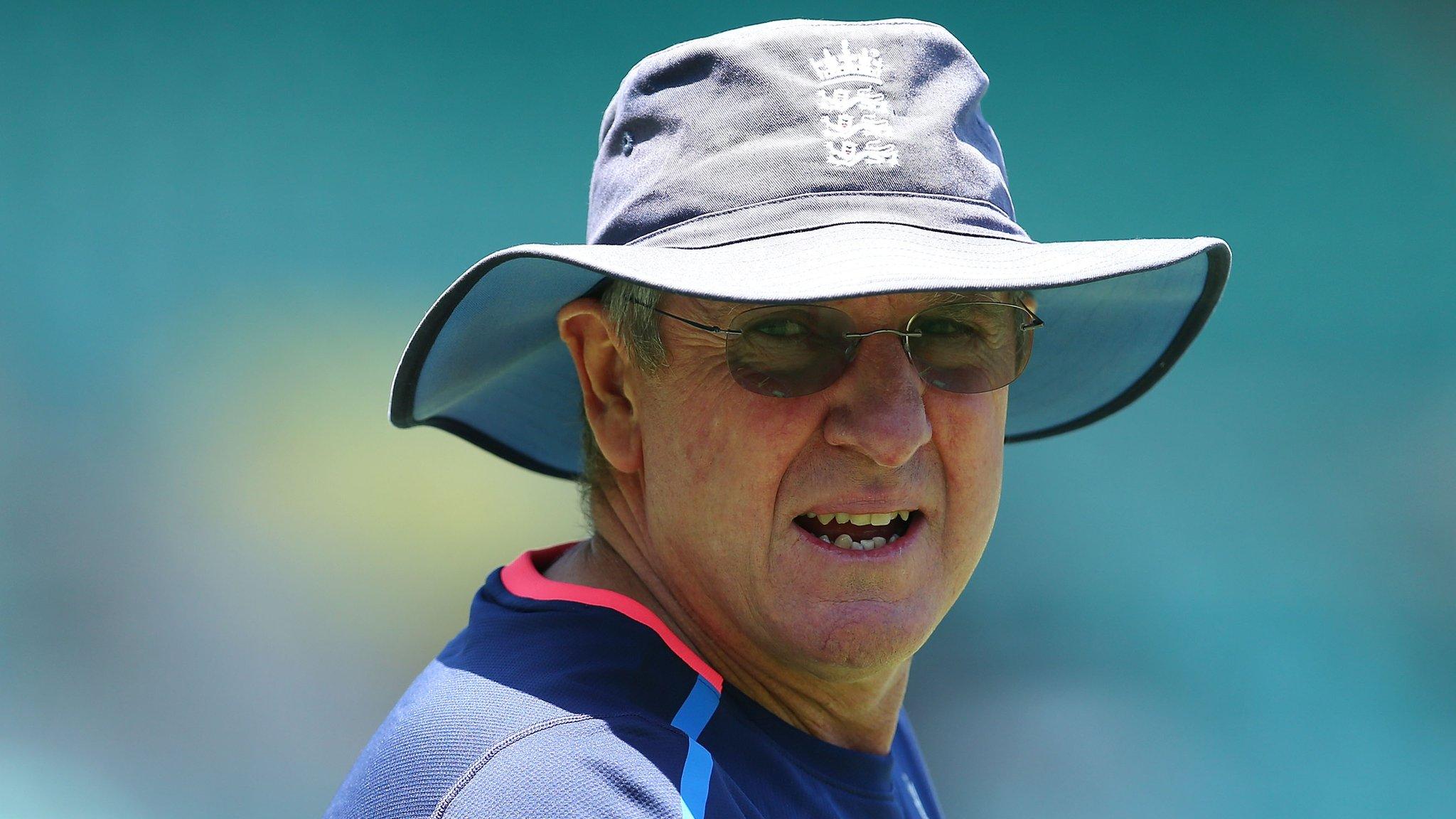
- Published8 January 2018
- Published8 January 2018
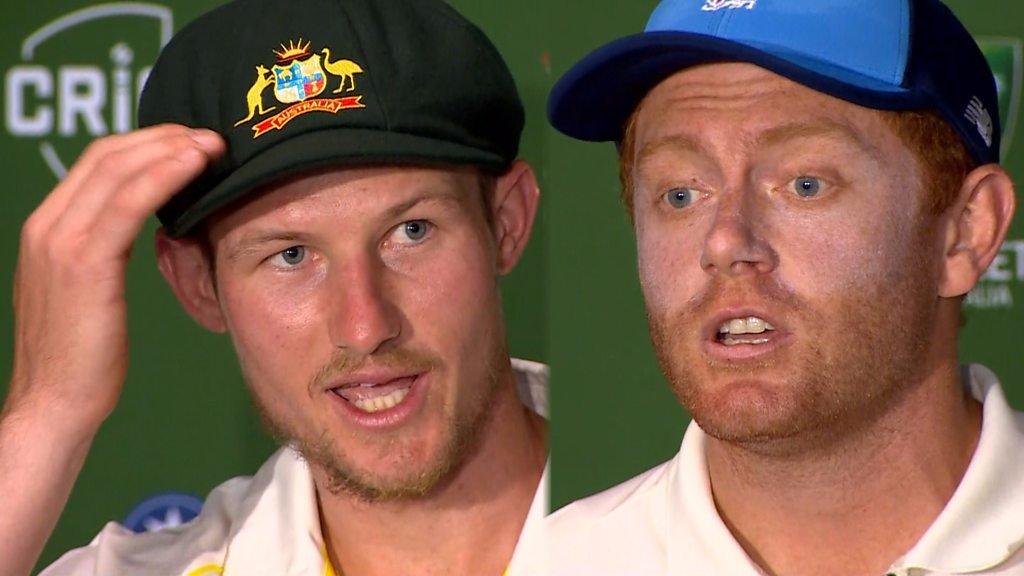
- Published8 January 2018
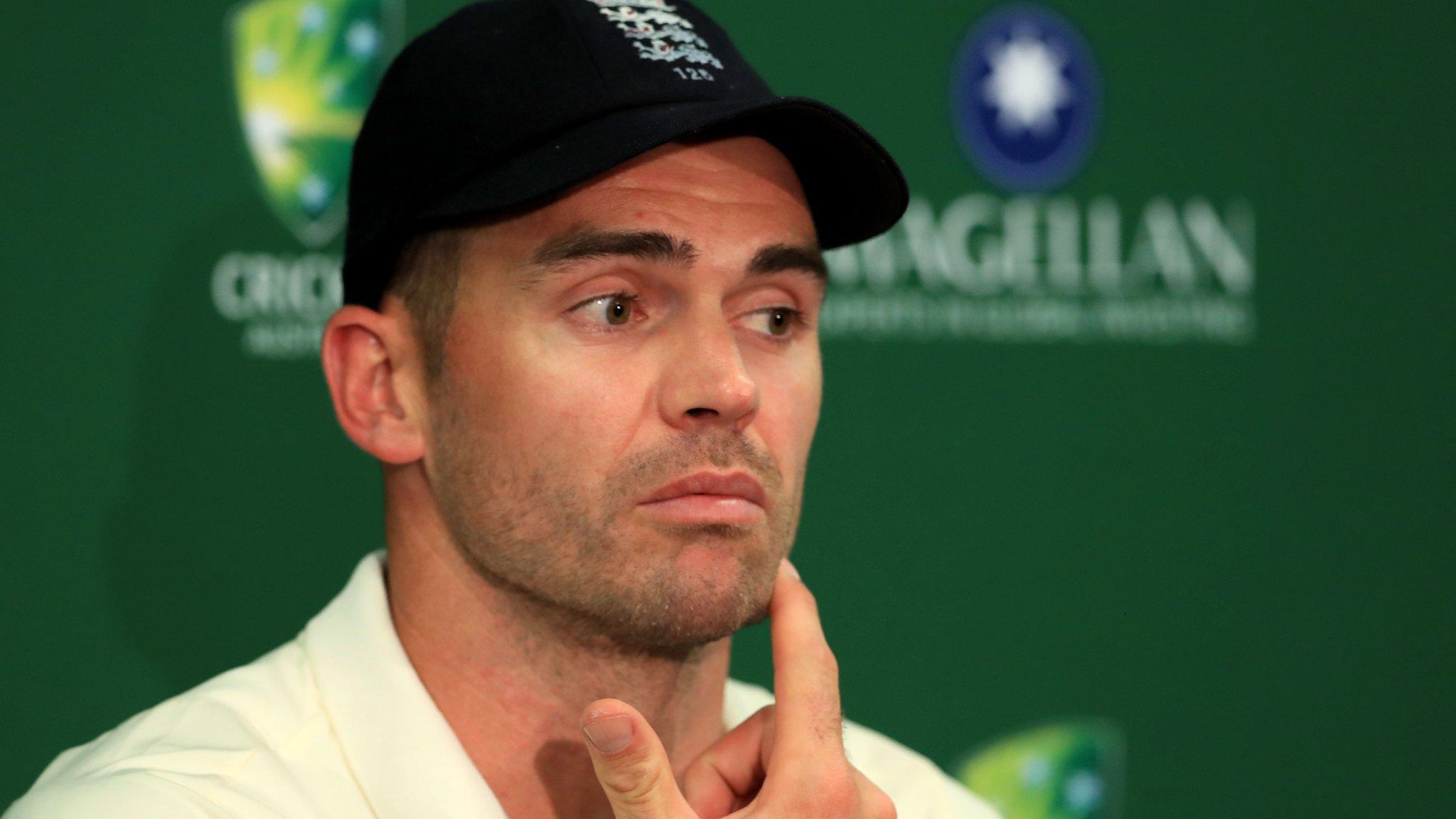
- Published8 January 2018
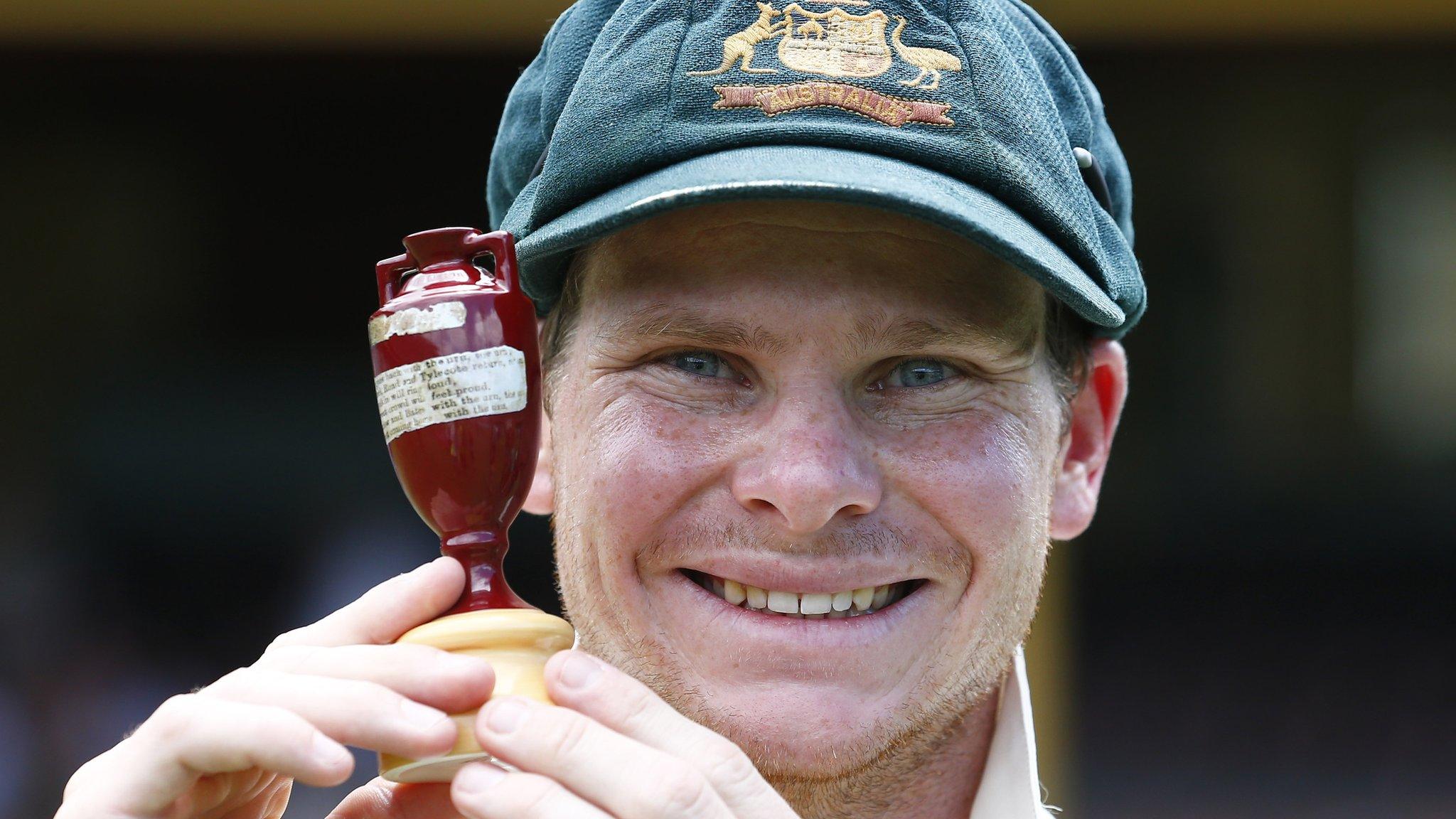
- Published8 January 2018
